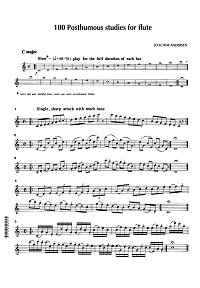|
Andersen - 100 posthumous studies for flute |
Andersen - 100 posthumous studies for flute
Andersen - 100 posthumous studies for flute. You can download the PDF sheet music Andersen - 100 posthumous studies for flute on this page. These 100 Posthumous Studies by Jpachim Andersen are concise, the tonal language used is traditional and they are musically convincing. 100 Posthumous Studies provide suitable material for elementary students as well as advanced players. The unusual feature of preceding each key with a scale has been transfered directly from the Andersen manuscript.
To download PDF, click the "Download PDF" button below the appropriate sheet music image.
To view the first page of Andersen - 100 posthumous studies for flute click the music sheet image. |
| PDF format sheet music |
|
|
|
Flute part: 36 pages. 8040 K
|
|
 |
|
|
|
| Download PDF (14.99
€) |
|
|
|
|
In the original manuscripts the studies are almost exclusively in the sharp keys, and a great many of them have 5 or 6 sharps- The composer must have had an almost overdeveloped ear for harmonies for he juggles with both double flats and double sharps, apparently with the greatest ease. The result of this, however, is that such pieces become extremely uncomfortable to play on the flute and therefore author have decided to transpose all studies with more than three sharps or flats as their key signature. Musically speaking, they gain from it and to the not-so-practised flautist, and author consider it will be a great help.
In many cases Joachim Andersen has been scrupulous enough to indicate tempo and nuances. Where such indications are missing, my suggestions will be found in brackets. All phrasing signs are original and the few remarks to the performer are Andersen's, too.
Joachim Andersen (1847-1909) is probably the most prolific composer of all times as far as composition of flute studies is concerned. Titles such as "24 Instructive Uebungen" (i.e. 24 instructive exercises), "26 Kleine Capricen" and "24 Grosse Etüden" are familiar to flute-players all over the world, and it is therefore a great pleasure for us to present-for the first time in print-this completely unknown collection of studies by Joachim Andersen,
|
|